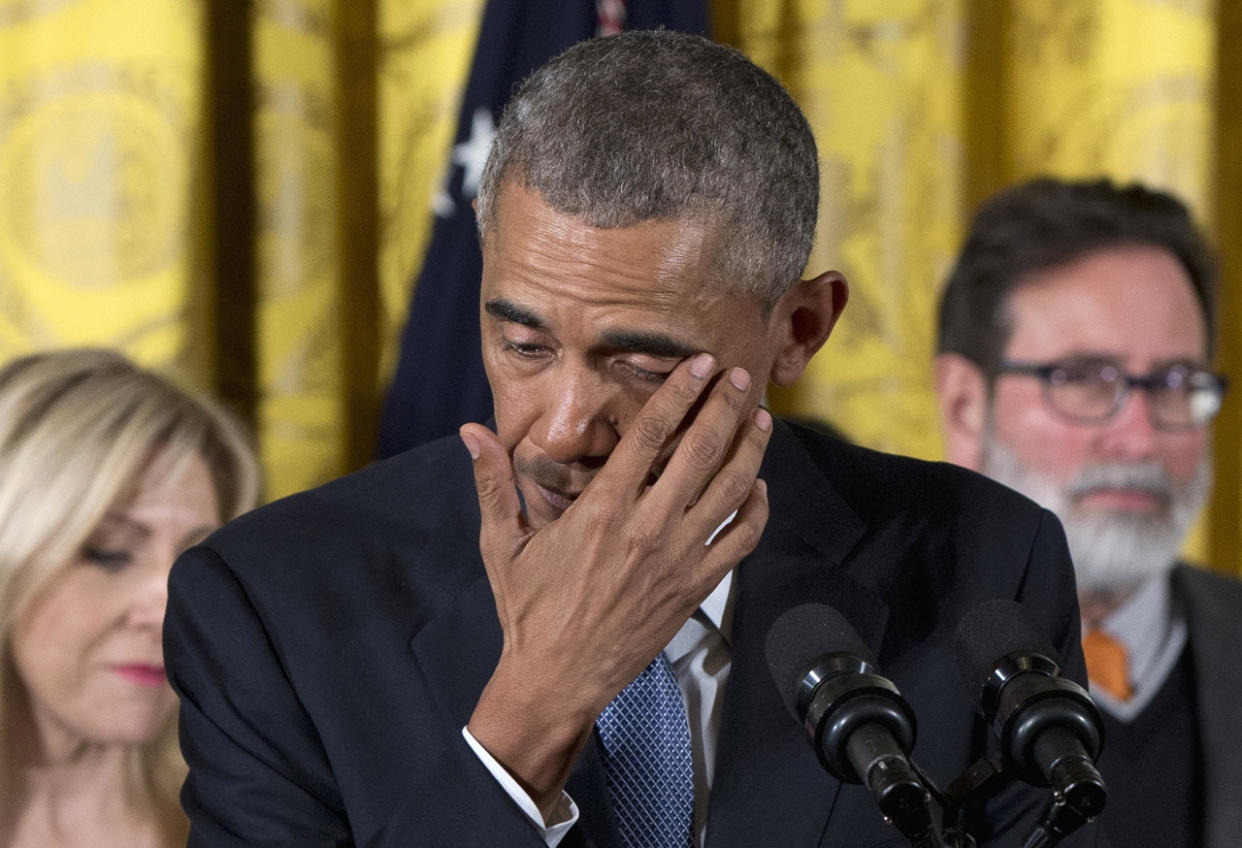Obama’s new rules won’t stop most online gun sales

Photo: AP/Carolyn Kaster
On Tuesday morning, tearing up before an audience of people affected by recent mass shootings in America, President Obama announced new executive actions to bolster national gun control measures, promising to change “a system in which dangerous people are allowed to play by a different set of rules than a responsible gun owner.”
The directives include expanding the number of gun buyer background checks and increasing hiring at the U.S. Bureau of Alcohol, Tobacco, Firearms and Explosives (ATF) to process them. The measures are meant to get around Congress’ refusal to pass legislation to limit the unregulated sales of guns.
Predictably, the move has angered supporters of gun rights, and Republican candidates were quick to weigh in. Chris Cox, executive director of the National Rifle Association’s legislative action group, responded that “the American people do not need more emotional, condescending lectures that are completely devoid of facts.” On the campaign trail, Donald Trump vowed, as president, to “unsign that [action] so fast.”
But Paul Helinski, the founder of the online gun marketplace GunsAmerica, was mostly unfazed.
“My business shouldn’t be affected by it, because there’s really nothing that has changed,” he told Yahoo News. “People are wondering: Can I still sell my guns online? The answer is if they’re your guns and you want to sell them, yes, even if you have 100 of them.”
It’s true that Obama’s executive order will change very little for the majority of gun sellers in America, especially licensed businesses with brick-and-mortar locations. Online marketplaces like Helinski’s site, which acts as a venue for private firearms deals for hobbyists, enthusiasts and others who don’t operate as a business, will also remain untouched. Instead, the order is aimed at a certain type of rogue gun seller operating in a vast and largely unregulated online weapon market with hard-to-track ads and transactions.
SLIDESHOW – Gun control debate >>>
Currently, the gun business is divided into two groups: federal firearms licensees who must require background checks of their buyers, and unlicensed dealers — many of whom are, in the administration’s view, exploiting the loophole that allows occasional sales of personal weapons. Those in the latter category sell guns at trade shows and, increasingly, via online marketplaces like Armslist. These sales require no background checks in 32 states. And though the ATF doesn’t track the number of guns sold online, Jonas Oransky, counsel for the nonprofit Everytown for Gun Safety, estimates that millions of guns change hands this way every year.
“This executive order was created for a specific type of individual,” Helinski said, referring to online buyers and sellers who avoid documenting their high-volume transactions. “They troll Facebook gun-for-sale boards, or websites that are much like Craigslist for local sales because there’s no record of it.”
Under existing law, a gun owner who wants to sell a weapon from her personal collection need not go through the paperwork of registering as a licensed dealer. But if you’re a seller who “devotes time, attention, and labor” to flipping AK-47s for a profit, then you are considered to be “engaged in the business.” In making that determination, the ATF takes several factors into consideration, including how quickly someone sells a gun after purchasing it, whether weapons are being sold in new or original packaging and if a seller advertises that she’s willing to acquire a gun she doesn’t already have. Courts have found that selling as few as two guns may qualify someone as “being engaged in the business.” If that’s the case, you must become a licensee and subject your customers to background checks.
But gun control activists say the existing standards are too loose.They’ve pointed to the large number of untraceable guns confiscated by police as proof that the law is frequently exploited via a massive digital black market. In a memo circulated to the press prior to Obama’s announcement, the administration clarified the new rules that will determine whether someone is “engaged in the business” of selling firearms. “Relevant indicators” will be the frequency of transactions and the quantities sold, regardless of whether a seller has a physical store or is selling on message boards. This guidance, Oransky argues, will result in more criminal penalties for unlawful dealers.
“Because of the vagueness in the standard, prosecutors have been accepting cases for prosecution of this charge at a remarkably low rate,” Oransky told Yahoo News. “When those cases actually go to trial, the convictions have been coming in at a remarkably low rate. We would hope that with this clarity we see higher, more robust figures.”
Some activists had hoped that, in clarifying this language, the administration would determine a cutoff number for guns sold per year, at which a merchant must automatically apply for a license.
“People were expecting that the administration would come out with some sort of numerical metric,” Adam Winkler, a constitutional law professor at UCLA, told Yahoo News. “I think the reason why they didn’t say that is they didn’t want to create another loophole. If they said it was 25 guns a month, someone’s going to sell 24 guns a month.”
According to Winkler, the only way Obama could have fully closed the unlicensed gun sale loophole is with actual legislation.
“As long as Republicans control the House, it’s not likely,” he said.

